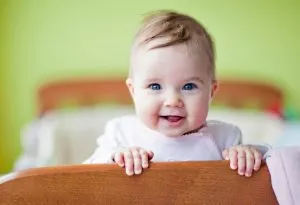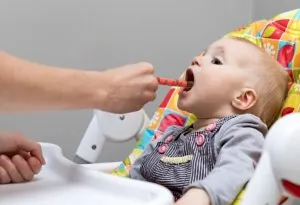Can U Feed Honey to Babies Warm
In this Article
- Video : When Can Babies Have Honey? Benefits, Risks and Tips
- Why Can't a Baby Under 1 Year Eat Honey?
- What Is Infant Botulism?
- When Can Babies Have Honey?
- What Are the Benefits of Honey for Toddlers?
- What If Honey Is Accidentally Given to Your Baby?
- Is It Safe to Use Honey Pacifiers?
- Honey in Different Forms
- Honey for Your Baby's Cough
- Honey Allergy in Infants
- FAQs
Who doesn't love honey? An age-old treat for kids and adults alike, honey elevates a person's mood and is a prescription for joyous occasions. But sometimes, a little bit can be a little too much for your little one. Although safe for adults, honey can lead to serious implications and, in severe cases, death, when given to a baby.
Video : When Can Babies Have Honey? Benefits, Risks and Tips
A powerhouse of vitamins and minerals, a small dose of honey can cause a whole world of damage if not consumed with the coming of the right age. Honey is ideal for toddlers and children, but it affects babies with emerging teeth, which is why most doctors do not recommend giving honey to babies between 3 and 6 months of age.
Why Can't a Baby Under 1 Year Eat Honey?
Honey occasionally contains a spore of a bacterium known as theClostridium botulinum. This causes a rare form of food poisoning in babies, symptoms of which come to light around eight to thirty-six hours after consumption. Honey can also damage a baby's emerging teeth, which is why a baby's age is an important criterion to consider before allowing her to consume honey.
The botulinum bacteria is abundantly found in soil and releases its spores, which contaminate honey and other substances. Heating, boiling, pressure-cooking, or pasteurizing does not eliminate these spores as they go unaffected and contaminate the honey. Although adults and children do not get affected, babies aged 12 months and below can be victims since they have immunocompromised systems and are developing.
What Is Infant Botulism?
Infant botulism is a condition that causes muscle weakness and breathing issues in babies. Infant botulism results from toxins that are produced inside the body once the baby ingests the bacteria through food sources. The most common source of infant botulism is honey, which contains bacterium spores that result in this condition. A baby contracts infant botulism once she consumes foods in which the bacterium has released the botulism toxins. Infant botulism can result from substances besides honey, as spores from the botulinum bacteria can land in other foods and substances from the environment. It is advised to limit outdoor exposure to babies, especially near the soil.
When Can Babies Have Honey?
Babies can be given honey once their first set of teeth emerges completely. Paediatrician recommendations state that babies can consume honey once they cross the 12-month mark and are over a year old. Babies are prone to the illnesses caused by spores of bacteria, especially between the ages of three to six months, due to their underdeveloped immune systems. Although honey can be consumed by children and adults, special care needs to be taken when it comes to babies and it is best that they don't consume honey until their immune systems develop wholly. Consumption of pasteurized honey for babies below 12 months of age is also not recommended.
What Are the Benefits of Honey for Toddlers?

Although infant botulism affects babies aged below 1 year, honey is safe for consumption by toddlers over 18 months of age. The following are the most noted benefits of honey for toddlers aged 18 months and above:
- Provides instant relief from cold, flu, and cough
- Strengthens the immune system
- Acts as a natural aid for sleep and eczema
- Is a storehouse of multivitamins, essential amino acids, minerals, and flavonoids
- Promotes regular bowel movements and enhances the health of the digestive system
- Contains rich anti-bacterial and anti-fungal properties which lead to faster healing of wounds
- Promotes cognitive development and improves mood levels
- Promotes increased energy levels throughout the day due to fructose content
What If Honey Is Accidentally Given to Your Baby?
If honey is accidentally given to your baby –
- If your baby is above 18 months of age: If your baby accidentally ingests honey in her meal, it is not going to be a huge problem since her immune system is developed and acidic enough to eliminate spores of the bacterium in their gastrointestinal tracts upon the consumption of honey.
- If your baby is below 12 months of age: She may be susceptible to paralysis and, in severe cases, death, due to an immunocompromised system. In this case, contact your doctor or concerned medical practitioner immediately.
- Look out for symptoms: If your baby has already consumed honey, look for signs of infant botulism, such as listlessness, lack of appetite, lethargy, and muscle cramps. Pressure-cook homemade foods to eliminate any spores of the bacterium and reduce the chances of botulinum spores developing in her gastrointestinal tracts. Before serving canned foods, boil them for 10 minutes.
- Prolonged constipation: If the situation worsens and your baby experiences severe constipation (which is one of the first signs of infant botulism), consider administering a dose of the Botulism Immune Globulin. This is a substance that treats the toxin ingested in the baby's digestive system and works immediately, thus preventing further complications. However, do consult your doctor once before doing so.
Is It Safe to Use Honey Pacifiers?
No. The fundamental fact about honey applies here too – any amount of honey can be dangerous for a baby below 12 months of age. There is a possible scenario of honey ingestion through the tiny hole present in the pacifier, which can pose a risk to your baby's health.
Honey in Different Forms
Honey can be used as a medicinal supplement for treating cough and infections. It cleanses the digestive tract and can be served with porridge and fruits. Tummy conditions like diarrhoea can be prevented with the help of honey. Honey is used in baked products and can also be served raw to kids aged two and above.
As a precaution, never serve honey to a newborn baby or infants aged 12 months and below. Infants above the age of 18 months are typically safe from the effects of the botulism spores and can be given honey in any form.
Honey for Your Baby's Cough
- For the treatment of fever, cold, and flu; mix 1/3 teaspoon of pure honey with a teaspoon of hot water. Give this to the baby and repeat this twice a day for best results.
- Babies above the age of two with upper respiratory tract infections can be given up to 2 teaspoons of honey during bedtime to reduce nighttime coughing and improve sleep quality.
- Honey contains a common cough suppressant known asdextromethorphan (in over-the-counter doses), which treats cough and cold effectively.
Honey Allergy in Infants
Infants and babies above the age of two may be allergic to honey due to pollen allergens being present in it. Children with weak digestive systems are also prone to this, which is why buying pasteurized honey from a certified brand is important.
FAQs
1. Can Babies Eat Baked Products Made of Honey?
According to the American Academy of Paediatrics and the World Health Organization, it is advised not to add honey (raw or pasteurized) to food, baked products, or formula for babies under 12 months of age. Thus, it is advisable to not allow babies to eat baked products made from honey.
2. Are Molasses & Corn Syrup Safe for Babies Under 12 Months?
Molasses and corn syrup may contain botulism spores, which are harmful to babies. Thus, it is not advisable to give these to babies under the age of 12 months. Molasses and corn syrup for consumption may be unsafe. For more info, please consult with your concerned paediatrician.
Can honey be given to babies? This is a question that can only be answered with age. When administering honey in meals or as a supplement, consider your baby's age and the condition of her immune system. It is best to consult a paediatrician before including honey in a baby's diet. Instead, focus on foods that can be substituted for honey. Please consult a certified paediatrician and nutritionist regarding your baby's dietary requirements and learn more about the foods that must be avoided by infants aged 1 year and below.
Resources and References: Healthline
Also Read: Raisins Consumption for Babies: A How-to Guide
Source: https://parenting.firstcry.com/articles/honey-for-babies-is-it-safe-benefits-more/

0 Response to "Can U Feed Honey to Babies Warm"
Post a Comment